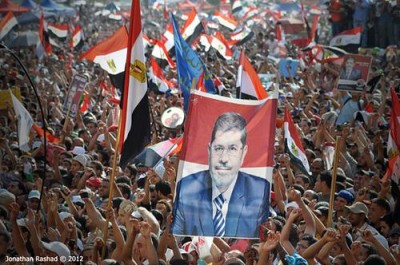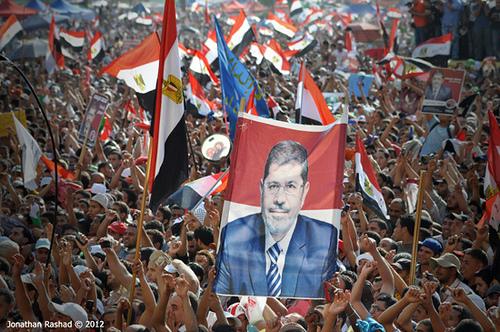The announcement by Egypt’s electoral commission that Muslim Brotherhood candidate Mohamed Morsi had won the run-off presidential election last week generated a joyous party, with music, dancing, chanting, and fireworks in the huge crowds who had gathered in Tahrir Square. But behind all the celebrating was a sober reminder that Egypt’s revolutionary process remains unfinished, and that its goals of freedom from dictatorship, real democracy, human rights are still unrealized.

Egyptians rallied in Tahrir Square to celebrate the election of Mohamed Morsi. Photo by Jonathan Rashad / Flickr.
In the week since the vote, after public counts showed a clear Morsi victory, Egyptians held their collective breath waiting for the decision of the military-backed election commission. Rumors were rampant, that the Supreme Council of the Armed Forces or SCAF, the generals who have held power since the overthrow of Mubarak last year, would not allow their long-time nemesis, the Muslim Brotherhood, to come to power at all, and would simply steal the election and hand the presidency to Shafiq, Mubarak’s own last prime minister with longstanding ties to the military hierarchy. The fact that it didn’t happen is one sign of the truly shifting power relations in Egypt — unlike the 30 years of the U.S.-backed Mubarak dictatorship, the military could no longer simply announce their decision and expect it to hold; post-Tahrir Square, the people’s voice still has to be taken into account.
But there are other power shifts that remain to be realized. There had been a significant call from a number of progressive and secular forces to boycott the run-off election, in protest of the paucity of choices. The limited option of choosing between the old regime or the old opposition did not reflect the breadth, the enthusiasm, and the power of the people’s revolutionary process that culminated in Mubarak’s overthrow by the protesters of Tahrir Square. The boycott call may well portend some of the future struggles that could pit supporters of the Muslim Brotherhood against those secular and religious forces calling for equality, citizenship, and human rights. But despite that boycott call, after the vote, many of the secular activists and organizations who had played such a central role in the Arab Spring uprising came together with the Muslim Brotherhood in a unified front to challenge the military’s continuing seizure of power.
The main threat to Egypt’s revolutionary trajectory right now comes from the seizure of ever greater positions of power by the SCAF. In the days following the vote, the SCAF dissolved the Brotherhood-dominated parliament elected several months ago, and announced that it was taking over the constitutional drafting process, that the new president would not command the military and would not have oversight power over the military and its enormous budget, including the $1.3 billion in military assistance the U.S. provides every year.
In a highly symbolic move, within an hour following the election commission’s recognition that Morsi had won the presidency, the SCAF also announced that since the parliament, for 40 years the site of presidential swearing-in ceremonies, was dissolved, Morsi would be sworn in at theSupreme Constitutional Court. The court, a holdover of the Mubarak era, had been the instrument used by the SCAF to provide a veneer of legality over its dissolution of the newly elected parliament, so imposing it as the venue for the new president’s taking office is a deliberate slap in the face to the notion that this election should herald a new day for post-Mubarak Egypt.
There have been rumors, though so far unconfirmed, that the Brotherhood negotiated terms of power-sharing with the generals during the days between the election and the announcement of results. In its first statements after the announcement Brotherhood spokesmen reaffirmed their commitments to represent all Egyptians, not only their own supporters, to standing for human rights, civil rights, women’s rights, minorities including Egypt’s Coptic minority, and more. But if they have already signed off on an agreement with the generals, their former tormenters, to allow military control to continue under a Muslim Brotherhood figurehead president, they may have to contend with as mobilized and determined a popular opposition as Mubarak did in his final days in power. Morsi’s announcement that he would choose his defense minister only after consultations with the SCAF does not bode well for claiming the real powers of the presidency.
It remains unclear whether protesters will demand that Morsi insist on swearing his oath of office inTahrir Squareitself, the place most resonant of the struggle to reclaim Egypt’s democracy. It remains unclear whether Morsi, or the Brotherhood, or protesters inTahrir Squarewill publicly call for the $1.3 billion inU.S.military aid to either be directed to the elected government or cancelled altogether.
The loudest chant inTahrir Squareremains “Down, down with military rule!” Many protesters in the Square have already announced their intention to remain in Tahrir once again, reprising the 18 days of the spring uprising, until the SCAF has transferred real power to the elected civilian government. Until that happens, the status of Egypt’s revolutionary transformation remains precarious, active, and unfinished. It is a reminder that no part of the Arab Spring is yet a finished revolution. These are revolutionary processes, still contested and still in formation. Revolutionary times, indeed.
